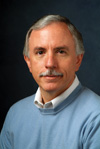With more than 200 sessions to choose from, the AACC Annual Meeting lets you customize a program that meets your needs
 Steven Zibrat, MS, MT(ASCP)
Steven Zibrat, MS, MT(ASCP)
Manager
Laboratories Quality Improvement
The University of Chicago Medicine
Chicago
Why is the AACC Annual Meeting & Clinical Lab Expo a must-attend event for you?
"I've had the good fortune to attend the AACC Annual Meeting & Clinical Lab Expo for more than 20 years and never tire of the opportunities it provides attendees. Learning best practices—both in formal sessions and through informal dialog with other attendees—is positively invaluable. I always return from the annual meeting reenergized and reinvigorated with ideas and enthusiasm to apply in my own lab and medical center the insights I’ve gained."
What annual meeting sessions are you planning to attend and why?
32216 Critical Result Management Practices: Global Perspectives and Recommendations for Best Practices Afternoon Symposium, July 28, 2:30–5 p.m.
"Despite improvements in information technology and connectivity in many healthcare organizations, critical value communication continues to be a challenge for many laboratories. Getting the right information, to the right person, in the right format, through the right mechanism, at the right time can range from the simple to the daunting. The opportunity to share information and learn about the latest and best practices in communicating laboratory information linked to potentially life-threatening or life-altering situations is truly invaluable."
73222 Troubleshooting Clinical Laboratory Errors: A Collaborative Case Study
Afternoon Short Course, July 29, 2:30–5 p.m.
"Laboratories are important partners in helping healthcare teams provide effective and safe care to our patients. One of our primary responsibilities is to be continually vigilant in all aspects of the total testing process for opportunities to improve processes that contribute to the provision of safe care. I’d like to attend this session to further develop my skill set in recognizing opportunities for improving patient safety."
63102 Chair's Invited Session: Driving Improved Outcomes – Towards Patient-Centered Laboratory Medicine
Morning Symposium, July 29, 10:30–12 p.m.
"Laboratorians at all levels continue to be challenged to objectively demonstrate how they contribute to the healthcare process. We have the potential to demonstrate significant value in the care process through provision of objective data and information but are in need of assistance in how best to use that information to tell our story. I believe sessions like this will provide us some strategies on articulating the laboratory value proposition."
32104 Evidence Based Test Utilization: Problems and Opportunities
Morning Symposium, July 28, 10:30–12 p.m.
"Sessions on utilization are becoming increasingly important in demonstrating how laboratories can help our healthcare organizations mine and package the wealth of data we produce to improve the quality, efficiency, and effectiveness of the care process in a medically and fiscally reasonable and responsible manner."
 Jose Jara-Aguirre, MD
Professor of Laboratory Medicine
Universidad Peruana Cayetano Heredia
Lima, Peru
Jose Jara-Aguirre, MD
Professor of Laboratory Medicine
Universidad Peruana Cayetano Heredia
Lima, Peru
Why is the AACC Annual Meeting & Clinical Lab Expo a must-attend event for you?
"I attend the AACC Annual Meeting & Clinical Lab Expo because I have the chance to learn state-of-the-art clinical laboratory science, technology, and analytical methods, as well as the clinical aspects of laboratory medicine. Also, I have the opportunity to network with recognized scientists from around the world. These experiences are amazing and useful for me in my work as a clinical laboratory professional and as a university professor. They all contribute to improving the quality of clinical laboratory services and patient care in my healthcare system and my country."
What annual meeting sessions are you planning to attend and why?
72108 Application of Patient Based Quality Control Algorithms in the Clinical Chemistry Laboratory
Morning Short Course, July 28, 10:30 a.m.–12 p.m.
'I plan to attend this session because I am looking for new quality control approaches in order to improve the quality assurance programs in the clinical laboratory, thereby improving patient care in my institution, as well as the quality of our overall total testing process."
33211 Diagnosing Thyroid Disease: Evaluation of TSH Measurements
Afternoon Symposium, July 28, 2:30–5 p.m.
"In this symposium, I expect to identify the major factors associated with lack of standardization and harmonization of TSH assays and the implications for the correct diagnosis of thyroid dysfunction, such as an over- versus under-diagnosis of hypothyroidism or hyperthyroidism. I also expect to learn how these analytical issues have a negative impact on clinical outcomes for patients who have received thyroid hormone replacement."
34103 Laboratory Testing During Pregnancy & What We Have Learned From Social Media
Morning Symposium, July 30, 10:30 a.m.–12 p.m.
"This type of symposium, which in this case attempts to resolve routine problems involved in interpreting pregnancy tests, is awesome, because I’m able to learn best practices and a better approach that enables me to improve patient care and achieve better
clinical outcomes."
74219 Hot Topics in POCT: New Standards and Practical Issues
Afternoon Short Course, July 30, 2:30–5 p.m.
"I plan on attending this course, which will discuss the new CLIA and CMS regulations and practical aspects on implementing point-of-care testing because I’m interested in learning about developing an individualized quality control plan."
32217 Self-Monitoring of Blood Glucose: 21st Century Issues
Afternoon Symposium, July 28, 2:30–5 p.m.
"I'm attending this symposium because it discusses new guidelines for glucose meters published by CLSI and ISO and the impact these new guidelines are expected to have on clinical laboratories, clinicians, and patients."
 Garrett Mullins, MS
Garrett Mullins, MS
Graduate Student
University of Virginia
Department of PharmacologyCharlottesville, Virginia
2014 SYCL Travel Grant Winner
Why is the AACC Annual Meeting & Clinical Lab Expo a must-attend event for you?
"I expect to become more prepared to enter a clinical chemistry training program. I also hope to meet clinical chemistry professionals and learn from their expertise. I would like to use this meeting to enhance my current research and lay the groundwork for a successful career in clinical chemistry."
What annual meeting sessions are you planning to attend and why?
32103 The Skinny on Fats: Current Recommendations and Controversies in Lipid Testing
Morning Symposium, July 28, 10:30 a.m.–12 p.m.
"In my graduate research, I have focused on how lipids impact adipocyte signaling, and how this affects insulin sensitivity. I am very interested in how lipid testing is currently used in the clinical laboratory."
72221 Enhance Your Leadership Skills to Improve Employee Satisfaction and Engagement
Afternoon Short Course, July 28, 2:30–5 p.m.
"I know that leadership skills will be essential to direct a clinical laboratory, and it is never too early to learn them!"
43106 Utilization of Mass Spectrometry in the Clinical Laboratory
Brown Bag, July 29, 7:30–8:30 a.m. and 12:30–1:30 p.m.
"I have had some experience using mass spectrometry to detect different lipids during my time as a graduate student. I am anxious to apply this skill to the clinical laboratory."
43108 Type 2 Diabetes: How Biomarkers Can Help for Cardiovascular Risk Assessment
Brown Bag, July 29, 7:30–8:30 a.m. and 12:30–1:30 p.m.
"I am interested in using the types of lipids released from adipose tissue as biomarkers to assess cardiovascular risk."
44111 What Do You Want To Do When You Grow Up? Choosing or Changing Your Career Path in Clinical Chemistry
Brown Bag, July 30, 7:30–8:30 a.m. and 12:30–1:30 p.m.
"An obvious choice for a student just beginning a career in clinical chemistry. I’m wondering when I’ll feel grown up."
44121 Metabolic Syndrome, Obesity, and Diabetes Mellitus: The Common Clinical Scenario
Brown Bag, July 30, 7:30–8:30 a.m. and 12:30–1:30 p.m.
"I am very interested in the commonalities of these conditions and how they can be interpreted in the clinical laboratory."